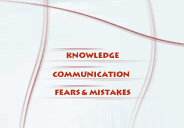You can start by setting a good example, and don't overdo the amount of caffeine, tobacco, alcohol or pills you may take. If you take tranquillizers, for example, or enjoy a Friday night drink, talk to your child about it. It is important that he or she understands that you enjoy a drink with your friends from work. It's pleasant way to unwind and look forward to the weekend ahead. Or perhaps, due to a particularly stressful situation, your doctor has prescribed tranquillizers for a while. Also, many adults are too casual about the drugs in their own medicine cabinets. Be sure you dispose of old pills. |

